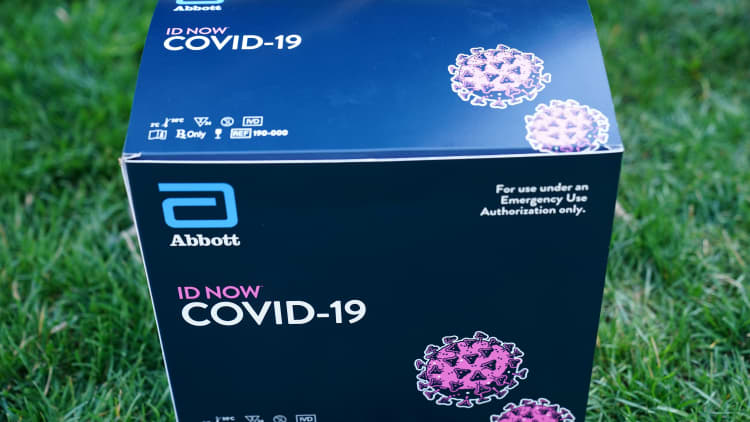Abbott Labs' rapid coronavirus diagnostic test that's used by the White House could be missing nearly half of positive cases, according to a new study from researchers at New York University, which describes the test as "unacceptable."
The study, which has not been peer-reviewed, found Abbott's ID NOW test missed a third of samples collected with nasopharyngeal swabs that tested positive with a test from rival Cepheid. When using samples collected with "dry nasal swabs," the Abbott test missed more than 48% of positive cases, the study said. Both nasopharyngeal swabs and dry nasal swabs are collected from the nostril, but the former is inserted much deeper into the nose.
The methodology and the study have not yet undergone critique from colleagues and have not been edited or published by an academic journal.
Abbott Labs refuted the study's claims that its rapid coronavirus diagnostic test could be missing nearly half of positive cases.
The Abbott ID NOW test demonstrated 91% sensitivity and 100% specificity in a separate study conducted in Washington state, the company said in a series of tweets Wednesday evening.
"While no test is perfect, Abbott's ID NOW is delivering reliable results when and where they're needed most," the company said in its response. "The world needs a variety of tests in labs and at point of care, and as many as possible, if we are to help reduce the risk people have every single day of contracting the virus."
Abbott said it has many questions for the authors of the New York University study authors.
"We are reviewing the information in this non-peer reviewed study," a spokesperson for the Food and Drug Administration told NBC News.
The urgency to ramp up coronavirus testing in the U.S. "has eased the usual scrutiny" applied by the Food and Drug Administration before the release of a new test, according to the authors of the study. The FDA has issued emergency use authorizations for multiple tests, including Abbott's, which means the tests can be used "without the more rigorous scrutiny to which tests are normally subjected to prior to FDA approval," according to the study.
Capacity to test broadly throughout the population will be key to quickly detecting and preventing pockets of outbreak as states reopen nonessential businesses and ease restrictions, officials say. Point-of-care test like Abbott's, which can yield results in as little as five minutes, are crucial to the effort.
Abbott disputed the findings of the study, adding that it has distributed about 1.8 million of the tests and the reported false-negative rate is 0.02%.
"Once again, a study has been conducted using ID NOW in a manner that it's not intended to be used. It's unclear if the samples were tested correctly and we're further evaluating these results," Abbott spokeswoman Darcy Ross said in a statement. "The outcomes in this paper are inconsistent with any experience that we've had with this instrument."
The Abbott test became less accurate as the viral load in each sample decreased, the study said.
"Based on our findings we could argue that the Abbott ID NOW detects samples with high viral load or possibly viable virus that could be of importance for transmission," the study said. "But, the fact that it misses positive samples on patients being admitted to the hospital with clinical picture of COVID19 makes this technology unacceptable in our clinical setting."
The Abbott test is more efficient and portable than standard Covid-19 diagnostic tests, which often require samples to be shipped to a lab that has the necessary equipment to analyze the results. Abbott received emergency use authorization for the test on March 27.
Politicians and officials have called for proposals for new rapid, point-of-care testing technology to quickly ramp up the country's capacity to test for the virus, which will be key in preventing a resurgence as states begin to reopen.
President Donald Trump has previously touted the Abbott test at press briefings and the White House currently uses the ID NOW test to regularly check officials, including Trump, and to screen visitors.
Several retailers, including Walgreens and CVS Health, that have opened drive-thru coronavirus testing sites currently use the Abbott test.
-CNBC's Salvador Rodriguez contributed to this report



